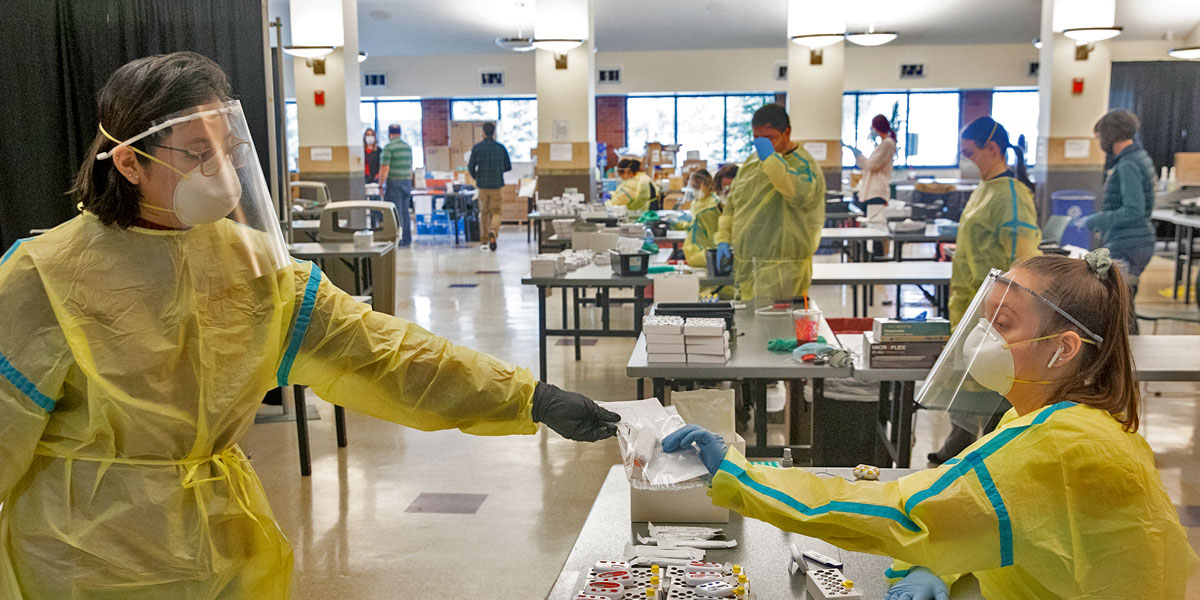Campus reaches testing milestone
More than 100,000 COVID-19 tests administered since September 2020

Binghamton University hit a COVID-19 milestone Monday, March 29, when it administered its 100,000th COVID-19 test since Wednesday, Sept. 2.
The count does not include the several thousand tests administered prior to students moving into their residence halls, but does include all other tests administered to students, faculty and staff since the beginning of the fall 2020 semester, including for the spring semester move-in.
“An incredible amount of cross-divisional work has gone into developing our testing program, from those in student affairs who created our notification and tracking process, to others in operations who manage our testing center, to our Health Services and case management staff who handle our diagnostic and contact tracing activities,” said President Harvey Stenger. “And I can’t forget the hundreds of people from all areas of campus who have stepped up to make it happen. I am proud of the entire effort and thank everyone involved.”
“The SUNY dashboard, where our test numbers are reported, includes all surveillance, diagnostic and pooled testing that was done for intercollegiate athletes since Wednesday, Sept. 2,” said Johann Fiore-Conte, associate vice president for student affairs and chief health and wellness officer for the campus. “The majority of the tests have been rapid antigen tests administered at the campus Surveillance Testing Center in the University Union.
“Diagnostic testing conducted at the Decker Student Health Services Center for those exhibiting symptoms has utilized a combination of antigen, rapid point of care PCR tests and external lab-processed PCR tests,” she added. “And our intercollegiate athletes, who have had a rigorous testing schedule, have used the pooled testing through SUNY Upstate Medical Center that many other SUNY schools are using.”
Testing was done randomly for the fall semester and ramped up to include every student, faculty and staff member who regularly comes to campus in the spring semester, said David Hubeny, executive director of emergency management.
Overall, the campus positivity rate is 1.17%, with current positivity rates of 0.27% for students and 0.13% for employees, based on the 14-day rolling average established for all SUNY schools.
With inconsistent supply chains, it has sometimes been challenging to access the appropriate tests to meet campus needs, Fiore-Conte said. “We’ve had to pivot from one test to the other based on circumstances and need, and scaling up testing volume quickly was a challenge that the campus has risen to. We have created a solid, comprehensive and adaptable testing plan.”
“From an operational perspective, the biggest challenge has been staffing the site,” Hubeny said. “We have used a combination of staff who have volunteered, students who are receiving academic credit, student employees and per diem staff who primarily fill clinical roles.
“It takes over 200 people to keep the site running. Coordinating and managing that many people requires significant effort,” Hubeny explained.
Testing has been key to rapid identification of positive cases, isolation of positive individuals and quarantining of contacts of positive cases, Fiore-Conte said. “This is and has been very important in mitigating transmission of the virus. We have used testing for its diagnostic purposes as well as for case finding and monitoring campus-wide trends.”
The campus anticipates that testing will continue through the summer and possibly into the fall, though who will require testing and how tests will be administered will likely be modified as more people are vaccinated. “There will likely be guidance from the New York State Department of Health, SUNY and the state for testing plans moving forward, which will influence our campus plan,” Fiore-Conte said.
Vaccinations are also key in stopping the virus and the University is positioning itself to facilitate vaccine administration to students when they become eligible, based on criteria set by the state. “Ideally, that would be prior to students leaving campus for the summer and returning to their home communities,” said Fiore-Conte.
“A group of us is actively working on a plan to deliver vaccines, but there are many unknowns at this time,” said Hubeny.
